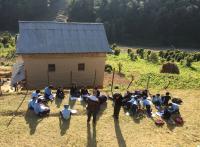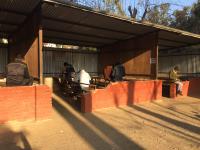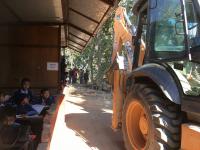(Re)-constructing the state: rebuilding government schools in post-earthquake Nepal
Project Summary
This research examines the contested process of everyday state-building through a study on school reconstruction projects in post-earthquake Nepal. Taking ‘reconstruction’ as an analytic space of possibility, this research investigates, firstly, the rebuilding of physical spaces and, secondly, the reconstruction of discursive spaces within which they are embedded i.e. ideas and narratives about the (failing) state education system in Nepal. This research will specifically focus on ‘aftermath epistemology’ to understand the ways in which a post-disaster shock is utilised to construct new visions for collective futures. By drawing attention to ongoing and new interventions by the state in spaces where everyday life is disrupted by a disaster, this aims to explore everyday practices of the state and the ways in which state is experienced, engaged with, and re-imagined by people.
Project Narrative

Disasters necessitate large-scale interventions and offer unprecedented opportunities for state-(re)building, in which states lead relief, restoration, and reconstruction interventions. Such opportunities are exemplified in the case of recent post-disaster contexts as diverse as China, India, Turkey, Mexico and Chile. However, the existing literature on post-disaster reconstruction overwhelmingly focuses on national and international nonstate humanitarian actors, thereby ignoring domestic state (re-)building: a fundamental aspect of post-disaster reconstruction. The literatures that do refer to the role of the state, is replete with the narratives of state failure, especially in the countries labelled as ‘weak’, ‘failed’, and ‘fragile’ state such as Nepal. This emphasis on ‘hopes against’ the state not only undermines ‘hopes for’ the state but also averts a systematic inquiry into its workings.

Consequently, we know little about the processes through which the state consolidates its institutions, and the implications of such consolidation on the evolving nature of state-society relationships. Anthropological studies of the state increasingly demonstrate that the everyday practices and discursive construction of the state might be fruitfully studied as spaces to understand the multiple dimensions of stateness. The anthropological literature on education also alerts us that the changing meanings of education in historically-contingent settings are critical for any education systems. These insights resonate with the intellectual calls in the literature on everyday statebuilding which asks us to appreciate that states must continuously renew their authority amidst a variety of challenges and foreground the multiplicity of its modalities.

Moreover, the vast literature on politics of show that disasters are more than just the moments of destruction. Rather, they offer an opportunity for new beginnings. These moments could act as windows into the complex dynamics of both ‘ruptures’ and ‘repairs’. Therefore, a close attention to the justifications for reconstruction programmes- what scholars have called ‘aftermath epistemology’- may provide insights into the ways in which a post-disaster shock can be utilised to construct new socio-political agendas and generate visions for collective futures. In such contexts, ‘hyper-visible’ infrastructure projects can also function as spaces to explore the invisible dimension of infrastructures where the rules governing space of everyday life are also constructed and negotiated by various actors. By drawing attention to ongoing and new interventions by the state in spaces where everyday life is disrupted, we may enable us to discern both everyday practices of the state and the ways in which state is experienced, engaged with, and re-imagined by people.
Research Activities
- Ten months of on-site fieldwork in one ‘model’ government school, and its interaction with key actors/institutions. Through participant observation and informal interviews, this will explore the everyday practices in reconstruction sites, routine procedures of education bureaucracies, and discern the rules governing these spaces.
- A comprehensive review of national reconstruction plans and proposals.
- A small-scale survey to conduct a comprehensive mapping of the range of ways in which physical infrastructure such as school buildings and classroom are reconstructed.
Researcher details
Uma Pradhan is Leverhulme Early Career Research Fellow at Oxford School for Global and Area Studies. Her research focuses on power-laden dimensions of education and examines the interconnection between state, society, and schooling.
Contact details
Uma Pradhan
Oxford School of Global and Area Studies
University of Oxford
Email: uma.pradhan@area.ox.ac.uk



